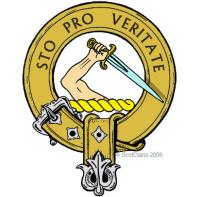
Clan Guthrie
Clan Guthrie People
Thomas Guthrie (1803 - 1873)
Scottish philanthropist, born at Brechin in Angus. He studied for the Church, and became a minister in Edinburgh. Possessed of a commanding presence and voice, and a remarkably effective and picturesque style of oratory, he became perhaps the most popular preacher of his day in Scotland, and was associated with many forms of philanthropy, especially temperance and ragged schools, the latter of which he was the founder.
He was one of the leaders of the Free Church of Scotland, and raised over £100.95,000 for manses for its ministers. Among his writings are The Gospel in Ezekiel, Plea for Ragged Schools, and The City, its Sins and Sorrows.
His statue on Edinburgh's Princes Street bears the following incriptions: "An eloquent preacher of the gospel. Founder of the Edinburgh Original Ragged Industrial Schools, and by tongue and pen, the apostle of the movement elsewhere. One of the earliest temperance reformers. A friend of the poor and of the oppressed."
Malcolm Guthrie (1903 – 1972)
Malcolm Guthrie was born in Hove, Sussex, England, the son of a Scottish father and Dutch mother. A professor of Bantu he is known primarily for his classification of these languages. The classification, although certainly not undisputed, is still the most widely used.
The magnum opus of Guthrie is Comparative Bantu which appeared in 4 volumes published in 1967, 1970, and 1971. The 4 volumes provide not only a genetic classification but also a reconstruction of Proto-Bantu as the Proto-language of the Bantu language family.
Guthrie also published extensively on a wide range of Bantu languages, including Lingala, Bemba, Mfinu, and Teke.
The Right Honourable General Charles Ronald Llewelyn Guthrie, Baron Guthrie of Craigiebank, GCB, LVO, OBE (born 1938) Chief of the Defence Staff between 1997 and 2001 and Chief of the General Staff, the professional head of the British Army, between 1994 and 1997. He is a cross bench member of the House of Lords. He was created a life peer after retiring as Chief of the Defence Staff. He was one of the several retired Chiefs of Defence Staff who spoke out in the House of Lords about the risk to servicemen facing liability for their actions - for which politicians are ultimately responsible - before the International Criminal Court, particularly in respect to the invasion of Iraq. He is a Knight of Malta.







